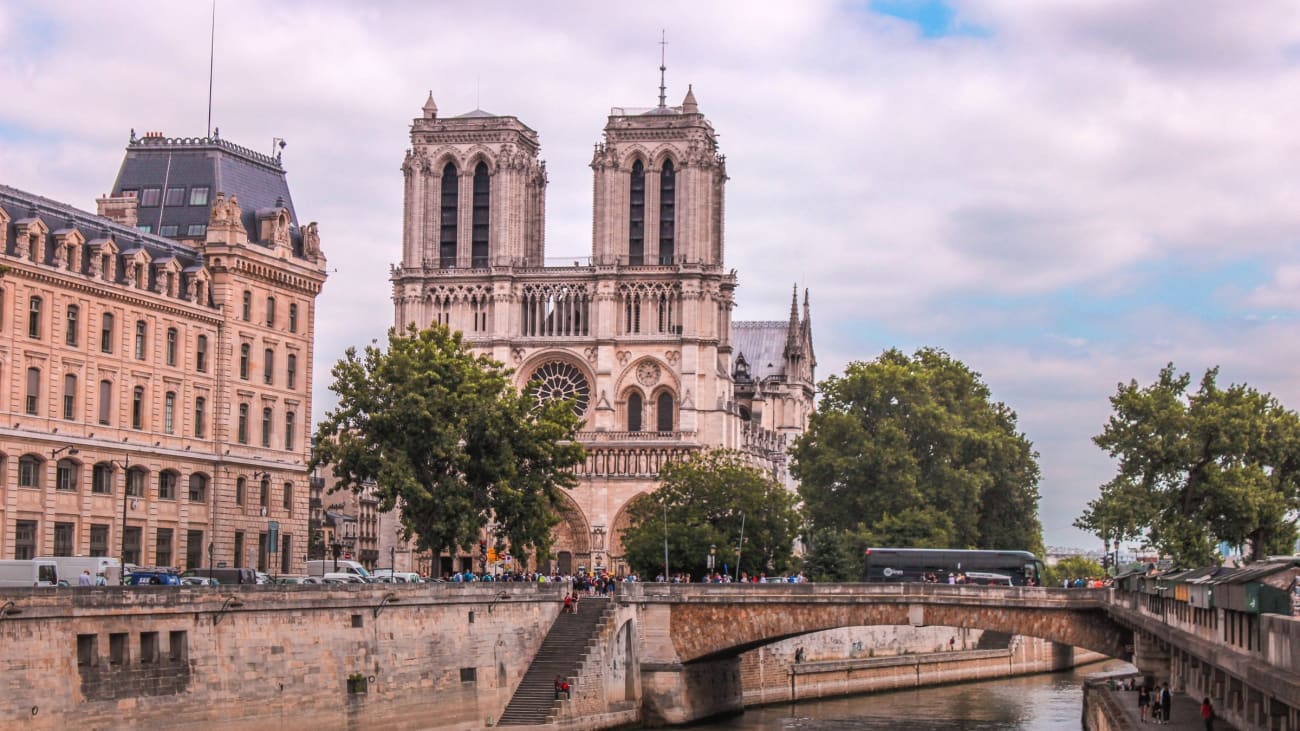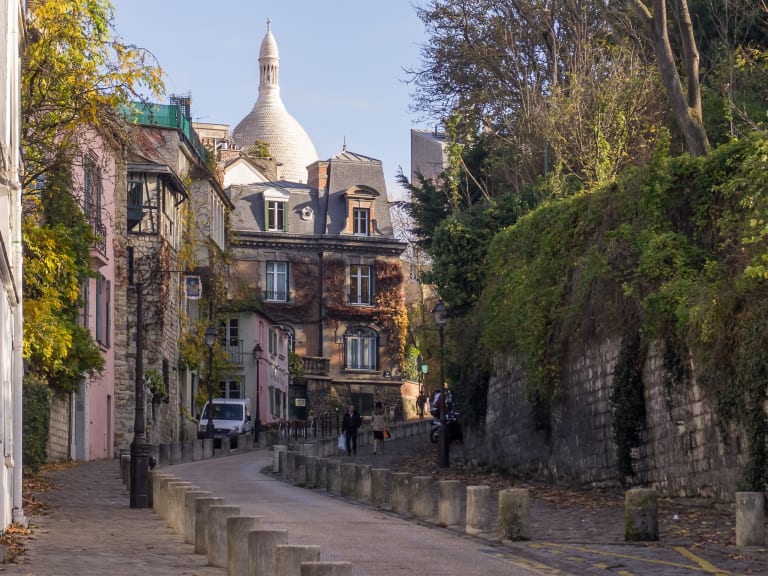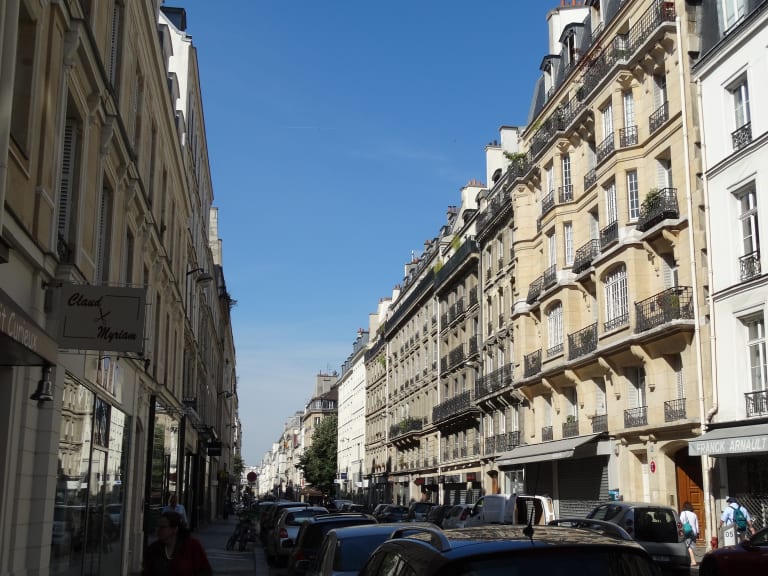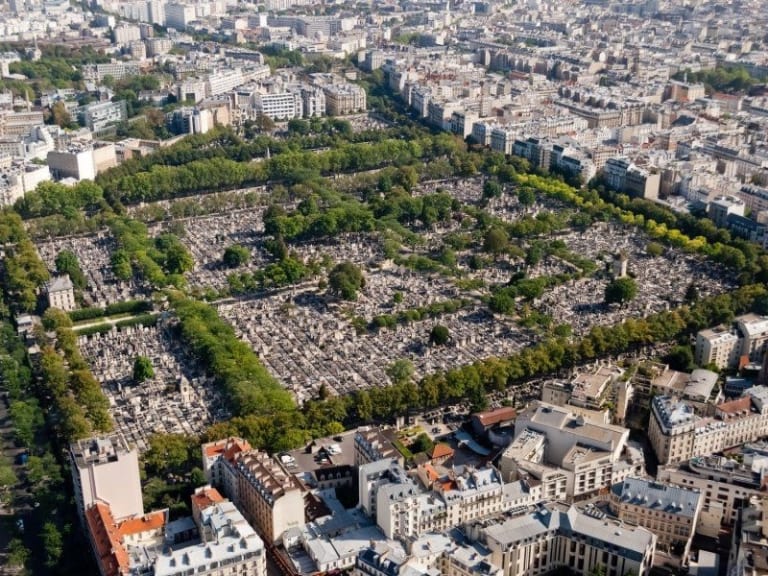Top 10 Neighbourhoods in Paris
Paris is an inexhaustible city with many districts full of things to see. Here are the must-sees on your visit to the French capital.

Notre Dame in Paris | ©Hannah Reding
Paris is a city with an infinite number of charms spread throughout its streets and neighbourhoods. The French capital has 20 districts or arrondissements. Many of them are authentic microcosms with their own atmosphere and urban life. Some of them are already mythical, especially because of their presence in a multitude of films and novels. I'm referring, for example, to Montmartre, Les Halles, Le Marais... and many others!
I'm bringing you the most interesting neighbourhoods in Paris, the ones you can't miss. In fact, with this information you will be able to design your visit to the French capital much better. Defining which aspects of Paris you want to explore in more depth can help you make the most of your experience. To get a better overview of what the city has to offer, check out our post on what to see and do in Paris.
1- Montmartre district

We begin with one of the most legendary places in Paris: the Montmartre district. Historically famous for being one of the epicentres of bohemian and artistic life in Paris, Montmartre is a good starting point to get to know the Parisian way of life, long before it was made popular by the film Amélie!
Without a doubt, one of the attractions of this area (and one of its icons) is the Sacre Coeur basilica. A monument built at the end of the 19th century, it is also one of the symbols of the city.
And how could we not mention another of its most famous spots: the Moulin Rouge. The mythical nineteenth-century cabaret which, nowadays, also offers various shows, although without the mischievousness that once made it famous. Nevertheless, it is one of the quintessential Parisian must-sees. If you are interested in visiting it, you can find out all the details on how to buy tickets for the Moulin Rouge here. It's certainly not for everyone, so if you're travelling with children, I recommend this article on what to see in Paris with kids.
2 - Saint Germain district

Undoubtedly one of the most artistic neighbourhoods, but not at all bohemian, but elegant and stately. This is the Paris of cafés and gatherings, where over a cup of frothy coffee you could found a literary movement or draft the basic principles of a constitution.
That, at least, is the legend surrounding one of its most famous cafés, La Procope. A place that happens to be the oldest café in Paris and the establishment that was visited by such distinguished clientele as Benjamin Franklin and Thomas Jefferson. It is not, however, the only legendary café you can visit. Among others, you can also visit:
- Café des Flore;
- Café des Deux Magots.
You can also stroll through its streets to enjoy its beautiful buildings, as well as significant monuments such as the Church of Saint Sulpice (famous for The Da Vinci Code) and the Abbey of Saint Germain Des Prés. This last monument will delight you if you like history (built in the 6th century, it is the oldest church in the city) or culture in general (the philosopher Descartes is buried there).
3 - Les Halles

One of the most central districts of the city, important until a few years ago as the site of an ancient medieval market. Today this enclave has been replaced by a beautiful garden that will delight you and provide you with a peaceful setting in which to rest from your stroll.
Culture is no stranger to this district either. In fact, you can visit the The "La Cité de l'Eiffel Tower", famous for having been the christening place of two essential personalities of French history and culture in the 17th century: Molière and Richelieu.
The Georges Pompidou Centre for Contemporary Art
But if art, and more specifically contemporary art, is your thing, Les Halles is one of your essential visits in Paris. This is where you will find the . Undoubtedly one of the most complete and most visited museums in the world devoted to this period of art. Here you can admire works by none other than the following geniuses of art:
- Miró
- Picasso
- Duchamp
- Mattisse
And many, many others!
4 - Le Marais

A most elegant neighbourhood, given that it was for many centuries the district of residence of the Parisian nobility and high society. This is partly due to its famous which gave prestige and importance to this area, which was originally a marshy area (in Spanish, its name means "the marsh").
In fact, if you are a lover of literature, you cannot miss the house of Victor Hugo, the immortal author of Les Miserables or Notre Dame de Paris, in the very Place des Vosges.
Although the best thing about Le Marais is to walk through its streets. Having been one of the centres of residence of the Parisian nobility, it ensures a stroll full of exceptional architectural works. Today, this district has a strong gay community, so its atmosphere is totally gay-friendly through its numerous pubs, nightclubs and cabarets.
5 - The Latin Quarter

One of the liveliest areas of the capital, largely because it has traditionally been the student quarter of Paris. In fact, its name "Latin" comes from the Latin that was so widely spoken in this district, as it was the predominant language at the Sorbonne.
Today it is, as I said, a vibrant place full of cafés, cinemas, theatres and an intense nightlife. But there are also attractions that are perfect for daytime discoveries. Here are some of the highlights:
- Luxembourg Palace and Gardens
- The Pantheon
- The Sorbonne University
- Saint Michel Square
- The legendary Shakespeare And Company bookshop
Interestingly, it is one of the areas in central Paris where prices are the most affordable. This does not mean that they are cheap, but simply that they are not as high as those that characterise other neighbourhoods nearby. This is good news if we take into account that this is where you will find the famous one of the best places to eat the typical crêpes.
6 - Observatory District

A place located on the left bank of the Seine, famous for housing the astronomical observatory of Paris, inaugurated in the 17th century. Spaces such as the Parc de Montsouris are also an interesting attraction, as it is a peaceful place to rest and take a break. However, the area's most intense attraction is its Catacombs, which I will explain below.
The Catacombs of Paris
Despite its name, this is not a Christian catacomb in the style of those you can admire in Rome. It was, in fact, a mine in Roman times, although much later, in the 18th century, it became a cemetery.
This new function has turned it into what it is today: an ossuary of 6 million skeletons with up to 800 metres of galleries completely covered with bones. Without a doubt, one of the most spooky (and at the same time fascinating) visits you can make in Paris.
As you can see, many Parisian attractions are spread out on both sides of the Seine, which can mean having to move around efficiently. For this, I advise you to find out how to get around Paris.
7 - Tuileries district

One of the most visited and busiest neighbourhoods in Paris. Not surprisingly, it is one of the areas with the most iconic attractions in the French capital. Here are some of the most important ones:
- Place de la Concorde
- Tuileries Garden
- Garden of the Royal Palace
- Madeleine Church
- Garnier Palace
- Place Vendôme
Nor should we forget the cultural delights. The Musée d'Orsay, devoted to Impressionist painting, and, of course, one of the jewels of the city: the Louvre Museum. A place that deserves a detailed explanation.
Louvre Museum
Probably the most complete museum in the world. Its walls treasure not only some masterpieces of painting (such as La Gioconda, by Da Vinci). It also houses works of sculpture, goldsmithery, ceramics... And the most famous: its collection of Egyptian art, one of the best (if not the best) in the world. In short, this is all the heritage you can find inside:
- Ancient art from the East
- Egyptian art
- Greek, Etruscan and Roman art
- Islamic art
- Sculpture from all periods and styles
- Paintings from all periods and cultures
- Decorative arts such as tapestries, jewellery, furniture, clocks and watches and much more.
As you can imagine, seeing everything the Louvre has to offer in one visit is mission impossible. To get the most out of your visit to this museum, I advise you to hire a guided tour that will take you to the essential. Although perhaps the best thing to do is to find out for yourself how long it takes to see the Louvre and, with this information, decide what interests you most. And if you're travelling with your children and you don't want to give up visiting the beauties of the museum, don't miss these tips on how to visit the Louvre with children.
8 - Ile de la Cité district

This district is the heart of Paris. Especially historically, as it is on this island in the Seine that the first settlements in the history of the city took place. Its status as the founding centre of the city has meant that some of its greatest symbols, especially religious ones, are located here. Among them is the Notre Dame Cathedral, which I will discuss in a few paragraphs. But it would be unfair not to highlight these other charms:
- Sainte Chapelle;
- The Palace of Justice;
- The Flower Market.
I advise you not to miss the Sainte Chapelle. It is a Gothic monument on a par with Notre Dame. This chapel, built in the 13th century by order of King Saint Louis, has an expanse of stained-glass windows in its walls that has not been equalled since by any original Gothic construction. To enter its interior is, quite literally, to be flooded by coloured lights.
Notre Dame Cathedral
Notre Dame is one of the most famous temples in the world. For many, it is the most perfect and best finished Gothic cathedral of them all. This is a matter of taste, although there is no doubt that some of the most important artistic events in Europe have taken place within its walls. And not only in architecture, but also in theology, music... The list would be endless.
The cathedral was built in the 14th century in a splendidly Gothic style, although other elements were added later. For example, the famous gargoyles, which date from the 19th century reconstruction.
Also, there are few things more pleasurable in Paris than strolling around Notre Dame, enjoying the views of the Seine. Just one tip: try to access the Île de la Cité from the Pont Neuf, another of Paris's iconic constructions. A stone bridge that will give you some of the most romantic views of the river.
9 - Trocadero

The Trocadero is another iconic part of Paris. Especially for hosting the following attractions:
- The Trocadero Gardens
- The Champ de Mars
- The Eiffel Tower
This is a very elegant area, full of fine architecture, diplomatic buildings and museums. But if it stands out for anything, it is for offering one of the best views of the Eiffel Tower, the quintessential symbol of Paris and the whole of France.
The Eiffel Tower
The "Iron Lady" was built for the Universal Exhibition of 1889. It did not take long for it to become one of the symbols of Paris. Today it is even one of the most popular monuments in the world.
It certainly has the qualities to enjoy such a reputation. Its 300 metres in height and 10,000 tonnes of weight are a marvel of engineering, particularly the talent of its architect, Gustave Eiffel. This technical feat has its aesthetic counterpart: from the Eiffel Tower you will enjoy unbeatable views. To find out more about this, I advise you to consult here the options for views of the Eiffel Tower that you can enjoy.
As you can imagine, it is also one of the most visited monuments in the world. This means that it is also one of the monuments with the longest queues. You will have to be patient even if you have already booked your tickets in advance. To avoid the hassle of overcrowding, check out these tips for visiting the Eiffel Tower.
10 - Montparnasse

Montparnasse is such an artistic district that even the reason for its name is cultural. It comes from Mount Parnassus, the site where the ancient Greeks believed the Muses dwelt.
It could be said that, in this case, the name fits it like a glove. It is one of the favourite Parisian neighbourhoods of writers. If you like literature, you'll probably love strolling through the same streets where writers such as Baudelaire, Flaubert, Cortázar, Verlaine, Rimbaud...
Such is its cultural importance that many culture lovers visit Paris above all to visit the famous Montparnasse Cemetery. An 18-hectare extension where, in addition to the great men of letters, personalities such as Edith Piaf and Jim Morrison are laid to rest.
These are, in short, the neighbourhoods that you cannot miss if you travel to Paris. If you don't have much time, you can go straight to the one with the charms that interest you most.
